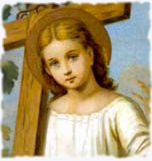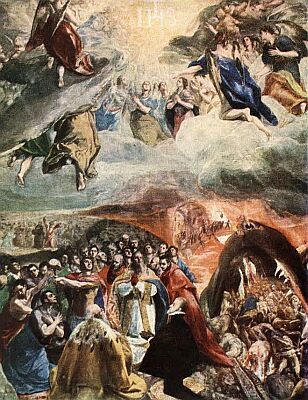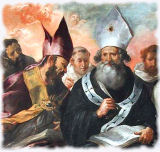Christmas Season
THURSDAY 3 January 2013
 |
| Fr. Nivard |
---- Forwarded Message -----
From: Nivard
Sent: Thursday, 3 January 2013, 9:21
Subject: Holy Name
From: Nivard
Sent: Thursday, 3 January 2013, 9:21
Subject: Holy Name
Most Holy Name of Jesus
Thurs 3rd Jan 2013WWM Adapted
'The Lord's name is holy.' For this reason we must not abuse it. We must keep it in mind in silent, loving adoration (CCC 2144).
As you know, St Aelred was always murmuring, “Jesu, Dulcis memoria”.
John 1:36 Look, there is the Lamb of God that takes away the sins of the world.
We live in a violent world. Our newspapers are full of it. Each day, we feel the effects of death and destruction.
We feel it in the home with domestic violence, on the streets with riots and public unrest and in war zones with broken bodies and much bloodshed.
So much of our trouble and heartache comes from aggression and anger.
We need to transform our minds because this affects the way we think and speak.
In this month’s message from Medjugorje, the Infant Jesus speaks in two short sentances:
"I am your peace,
live my commandments."
May our thinking and speech never include the anger, which often means the taking of God's holy name in vain.
Father, teach use to be peacemakers. Let us sow in peace and produce a rich harvest. By the power of the Spirit renew our minds and tame our tongues.
Father, teach use to be peacemakers. Let us sow in peace and produce a rich harvest. By the power of the Spirit renew our minds and tame our tongues.
Year I
 |
| Cardinal Pierre de Berulle |
First Reading Colossians 4:2-18
Responsory Col
4:3; see Ps 51:17
Let
us pray for one another, that God may give us an opportunity
+ to proclaim the mystery of Christ.
V.
May the Lord open our lips
that we may declare God's praises.
+ To proclaim the ...
Second Reading
From a meditation by
Cardinal Pierre de Berulle (Discours
de l'Estat
et des
Grandeurs de Jesus, 1-4)
The
mystery of the incarnation
The
divine Word, the splendour, power, and glory of the eternal Father, having been
sent into the world, desired to establish there a school of holiness, an order
of grace, a holy congregation, guided and animated by his Spirit, to speak to the earth in the language of heaven,
to teach human beings the
way to salvation, and to raise them to a lofty, and sublime knowledge
of God, making then, aware of the grandeur of his nature, the plurality of his persons, the profundity of his purposes, and the uniqueness of his works, which, by itself, the human mind could never have discovered.
06 Jan 2011
Mystery of the Incarnation - Berulle. Monastic Lectionary. CHRISTMAS SEASON THURSDAY Year I. Night Office. First Reading Colossians 4:2-18. Portrait of Cardinal Pierre de Berulle (1575-1629) - Philippe de ...



 The name of Jesus is a name of gladness, a name of hope and a name of love. A name of gladness, because if the remembrance of past transgressions afflicts us, this name comforts us, reminding us that the Son of God became man for this purpose, to make himself our Savior.
The name of Jesus is a name of gladness, a name of hope and a name of love. A name of gladness, because if the remembrance of past transgressions afflicts us, this name comforts us, reminding us that the Son of God became man for this purpose, to make himself our Savior.


 In celebrating the feasts of St. Basil of Caesarea and St. Gregory Nazianzen on the same day, the Church extols a virtue which she has always esteemed, friendship. The friendship between Basil and Gregory was admirable. Born in Cappadocia around 330, they studied together in Athens and then returned to their homeland where they led a monastic life for several years. Their temperaments were very different. While Basil had the qualities of a leader and a gift for organization that made him a legislator for monks in the East, Gregory was a contemplative and a poet.
In celebrating the feasts of St. Basil of Caesarea and St. Gregory Nazianzen on the same day, the Church extols a virtue which she has always esteemed, friendship. The friendship between Basil and Gregory was admirable. Born in Cappadocia around 330, they studied together in Athens and then returned to their homeland where they led a monastic life for several years. Their temperaments were very different. While Basil had the qualities of a leader and a gift for organization that made him a legislator for monks in the East, Gregory was a contemplative and a poet.



